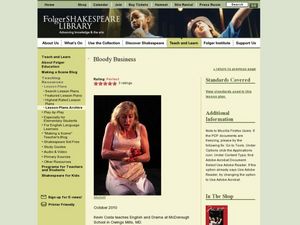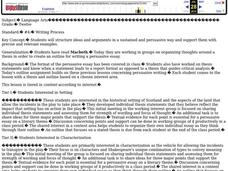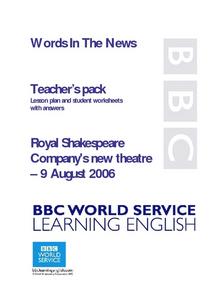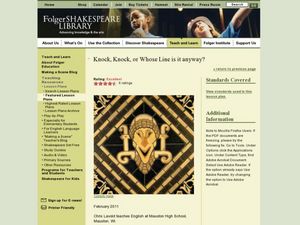EngageNY
Grade 10 ELA Module 4: Unit 2, Lesson 15
What goes around, comes around. Using the resource, pupils read Act 4.3 of Macbeth, in which Macduff and Malcolm plan to attack Macbeth. Scholars then hold a discussion and complete writing activities to analyze Shakespeare's structural...
EngageNY
Grade 10 ELA Module 4: Unit 2, Lesson 2
What is the best way to determine the theme of a text? Pupils analyze how central ideas emerge in Shakespeare's tragedy Macbeth. They work in small groups and engage in a whole-class discussion to discuss the play's plot. Finally,...
EngageNY
Grade 10 ELA Module 4: Unit 2, Lesson 9
How does Shakespeare develop the central idea of agency versus fate in Macbeth? Using the resource, pupils work in small groups to discuss the plot of Act 3.1. Next, they complete a brief writing assignment to analyze how the main idea...
EngageNY
Grade 10 ELA Module 4, Unit 2, Lesson 26
How do directors' choices emphasize different elements of a drama? Scholars participate in a discussion about the Royal Shakespeare Company production of Macbeth and Akira Kurosawa's Throne of Blood. Finally, they write an analysis of...
Curated OER
The Learning Network Fill-In: Macbeth for Children
Help your learners attain vocabulary and practice reading comprehension with this cloze activity. Created by The Learning Network, this resource provides a New York Times article with the words already removed. Pupils can fill in the...
Curated OER
Bloody Business
Students research word frequencies in Macbeth and create a frozen picture inspired by a word. In this Macbeth lesson, students view Blood Will Have Blood and discuss the dual meaning of the word "blood." Students identify five major...
Curated OER
"What are these...?"
High schoolers discuss the "witches" of Shakespeare. In this literature analysis instructional activity, students research the influence of Macbeth's sisters on his behavior. They examine various terms used to describe the sisters, and...
Curated OER
Writing Process
Students read Macbeth and work in groups to organize and create an outline for a persuasive essay. In this persuasive essay lesson, students work in tiered learning groups to organize their thoughts for a persuasive thesis about the...
Curated OER
An Actor's View of Shakespeare
Students research characters from different plays. In this Shakespeare and performing arts lesson, students discuss the portrayal of characters from the perspective of real actors. Students work in groups to examine the technique for...
Curated OER
The Play's the Thing
Students study the life and works of William Shakespeare. They investigate the art of playwriting and write a play of their own.
Curated OER
This Was the Noblest Roman of Them All
High schoolers analyze the problems with staging and character using the play Julius Caesar. They summarize the final scene of the play and view film versions of the scene. Additionally, they prepare a promptbook for the final scene and...
Curated OER
Literature: It's a Mad, Mad Macbeth
Students determine how the themes expressed in Macbeth are also applicable to contemporary society. They complete a series of written assignments demonstrating their comprehension of theme, content, and interpretation of the play....
Curated OER
Macbeth
Students engage in a variety of activities in order to complete a unit about the Shakespeare work of Macbeth. The lessons are part of a layered curriculum. The objective is to create a portfolio to create more layers.
Curated OER
Royal Shakespeare Company's New Theatre
Students brainstorm the names of Shakespeare's plays and read an article about a new theatre. They complete worksheets about the plays. In groups, they play a game where they give clues about films or plays and others try to guess the...
Curated OER
Double, Double, Toil and Trouble: A Dual Exploration of Macbeth
High schoolers emulate a key practice of Renaissance theater: doubling. The goal of this lesson is for students to experience-to see, hear, and feel-the differences between characters. Each group presents scenes to the rest of the class.
Curated OER
Macbeth Presentations
Young scholars make Powerpoint presentations or Web pages about Macbeth. Their presentations must include at least three elements from a provided list. They write reflective papers about their learning experience.
Curated OER
Knock, Knock
Students explore the use of sound as a special effect to enhance or radically change the meaning of a scene. They design a soundscape for Macbeth's porter scene, and conclude by listening to and watching two different film treatments of...
Curated OER
Who's There: Acting in the Dark
Students participate in a performance of Macbeth using the lighting techniques that were employed during the Shakespearean era. Working in groups, student reenact a scene. Afterward they discuss the challenges of working with limited...
Curated OER
Viciousness in "Twelfth Night" and "Lord of the Flies"
Students work in discussion groups to examine the treatment of Malvolio in Shakespeare's "Twelfth Night" by comparing the play to the novel "Lord of the Flies".
Curated OER
The Wooden 0
In this "The Wooden O" activity, students read about the first public theatres in London and answer discussion questions about attending a play during the 1500-1600's. Students then create a poster of the Globe theatre and perform an...
Curated OER
Julius Caesar: iambic pentameter
Read in iambic pentameter! Read Julius Caesar and Macbeth to study the famous meter. While the lesson points out the specific passages to use, you'll have to find them and copy them yourself.
Curated OER
And. . . Freeze!
Learners read a short section of a scene very closely and develop a tableaux as a start to the performance process. They write a paragraph in the voice of a character. They present their beginning, middle and end tableaux to the class.
Curated OER
HAMLET HOOK
Students their personal reactions to issues of family relationships in light of the the plot, characterization, and themes of the play. They analyze the characters of Hamlet on an emotional level not just intellectual.
Curated OER
Knock, Knock, or Whose Line is it Anyway?
Students compare two versions of Macbeth and participate in improvisational acting. In this improvisational lesson, students read and discuss the text before watching two different versions of the film. Students roleplay a scenario and...
Other popular searches
- Macbeth Shakespeare
- Shakespeare Macbeth Act 5
- Shakespeare and Macbeth Art
- Shakespeare Macbeth Language
- Shakespeare Macbeth Research
- Macbeth Shakespeare Unit
- Macbeth by Shakespeare

























